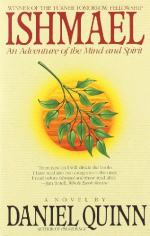
|
| Name: _________________________ | Period: ___________________ |
This test consists of 15 multiple choice questions and 5 short answer questions.
Multiple Choice Questions
1. In Chapter 4, how does the narrator say men used to live before they became men?
(a) Like the chosen creatures
(b) He says that they were always men
(c) Like every other creature
(d) Like the least noble creatures
2. What is the narrator’s reaction when he hears the rival creation story Ishmael tells in Chapter 4?
(a) He is furious
(b) He does not understand it
(c) He sees the point immediately
(d) He is amused
3. Upon answering the ad, what does the narrator say he finds in the room when he goes in?
(a) A phonograph
(b) A set of tools
(c) A bookcase
(d) A stove
4. What manipulation does the narrator say man had to learn in order to master his environment?
(a) How to manipulate the production of goods
(b) How to manipulate his food supply
(c) How to manipulate trade
(d) How to manipulate his womenfolk
5. What does Ishmael elicit from the narrator in Chapter 4 regarding his creation myth?
(a) That his creation myth is founded on falsehoods
(b) That his creation myth is damaging the earth
(c) That his creation myth excludes the perspective of women
(d) That his creation myth is centered on mankind
6. What pressure does the narrator say he feels to act out his culture’s stories?
(a) He says that he has to go to admit his belief in court
(b) He says that if he doesn’t work, he won’t eat
(c) He says that his neighbors exclude him if he expressed doubt about the value of the culture
(d) He says that his parents have threatened to disown him if he does not follow in their footsteps
7. What does the narrator say made the difference between men before and the men that live now?
(a) Writing
(b) Agriculture
(c) Stories
(d) Language
8. How long ago did the Takers’ story come into existence?
(a) 2,000 years ago
(b) 200-300 years ago
(c) 10-12 thousand years ago
(d) 20-30 thousand years ago
9. What does Ishmael say is the pinnacle of the story the narrator tells in Chapter 3?
(a) God’s laws
(b) Man himself
(c) Literature
(d) A just society
10. When does the narrator’s creation story begin?
(a) 250 thousand years ago
(b) 2 thousand years ago
(c) 4 billion years ago
(d) 10- 15 billion years ago
11. What does the narrator say the ad in Chapter 1 was looking for?
(a) Someone who wanted to work with gorillas
(b) Someone who wanted to teach
(c) Someone who wanted to change the world
(d) Someone who wanted to make an investment
12. When does the narrator recognize Ishmael in Chapter 1?
(a) When the keeper forces Ishmael to move
(b) When he is staring into his own eyes
(c) When Ishmael growls
(d) When Ishmael speaks to him
13. What distinction does Ishmael point out between Leaver and Taker cultures?
(a) The absence of guilt in Leaver culture
(b) The absence of the fear of death in Leaver culture
(c) The absence of prophets in Leaver culture
(d) The absence of medicine in Leaver culture
14. What does Ishmael say man’s importance must be, in the eyes of the gods, in the narrator’s creation myth?
(a) Man must be insignificant
(b) Man must be a creature of enormous importance
(c) Man must attain value as he understands the gods’ laws
(d) Certain men must be more important than others
15. How does Ishmael characterize the notion that agriculture started in the Fertile Crescent?
(a) He says that it has not been proved yet
(b) He says that it is subject to much debate
(c) He says that it is undisputed
(d) He says that it is an old hat
Short Answer Questions
1. What does the narrator say is his first impression of the room in Chapter 1?
2. In Chapter 6, Ishmael says that the narrator’s account of man’s progress stopped being applicable—how long ago?
3. What does Ishmael say the narrator will be the result of learning what he is teaching?
4. When does Ishmael say that human history began?
5. How does Ishmael define a story?
|
This section contains 695 words (approx. 3 pages at 300 words per page) |

|




